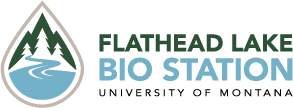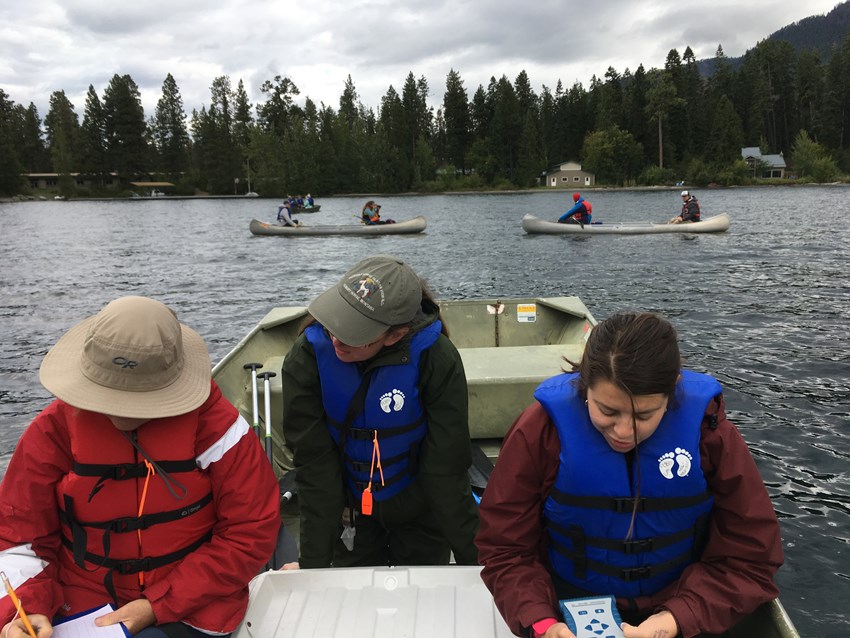New Workshop Provides Place-Based Professional Development for K-12 Teachers in the Flathead Watershed
There’s an exciting new training opportunity available to K-12 teachers in the Flathead Watershed.
This teacher workshop, aptly named “Flathead Watershed through the Seasons” (FWTTS), was made possible by the Glacier National Park Conservancy, with additional support from the University of Montana’s Flathead Lake Biological Station and in-kind contributions from numerous local agencies and organizations that include the U.S. Forest Service, Glacier National Park and Lone Pine State Park.
The FWTTS workshop was planned and organized by a steering committee comprised of Flathead Community of Resource Educators (CORE) members. These members represent a diverse group of organizations and agencies around the Flathead Watershed, which include Glacier National Park, Flathead National Forest, Glacier Institute, Flathead Lake Biological Station, Montana Fish, Wildlife & Parks – Lone Pine State Park, Northwest MT Educational Cooperative, Forest for Every Classroom Graduates and the Whitefish Center for Sustainability and Entrepreneurship.
Flathead CORE is a broad network of individuals, educators and organizations that work together to increase awareness and understanding about the natural, historical and cultural resources of the Flathead region.
“The aim of the workshop is to produce and provide a high quality education experience and development training for our teachers,” said Teresa Wenum, a conservation education specialist for the U.S. Forest Service and one of the driving forces behind the FWTTS workshop. “We wanted to be able to give teachers the opportunity to engage in place-based learning and start building connections with experts and professionals in their local communities.”
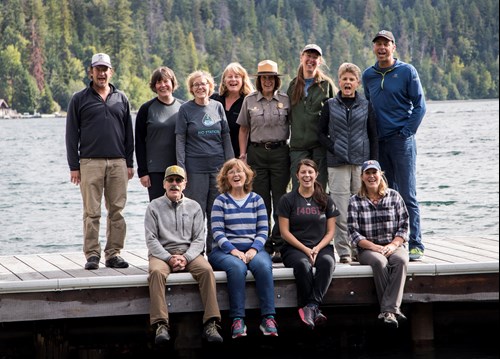
The inaugural class of the Flathead Watershed through the Seasons professional development workshop pose for a photo during their fall retreat at the Flathead Lake Biological Station.
The FWTTS workshop offers four independent sessions to a group of teachers. Each session provides place-based learning through ongoing field experiences and takes place at a different geographic location within the Flathead Watershed during a different time of year. Only 8 to 12 teachers are accepted into the workshop to ensure an engaging and hands-on experience.
For the FWTTS steering committee, being able to connect teachers not only with place, but also with experts and professionals from all over the Flathead Watershed is a vital piece of the workshop experience. The Flathead Watershed spans from southeastern British Columbia and Glacier National Park in the north to the Clark Fork drainage in the south.
The workshop engages a diverse cast of natural resource land management agencies, businesses, non-profit organizations and schools within the watershed. These experts and professionals are highly involved in the programming of each session, providing engaging activities and discussions to help teachers learn more about the place they live.
Wenum said that in addition to connecting teachers with local experts, the workshop also offers tools and support to help participants integrate more place-based learning into their own classrooms.
“We made a point not to give the teachers any specific curriculum to use,” Wenum said. “These teachers know their students, and they know what’s best for their classrooms. We wanted to give them some tools for their toolbox, but we really want to allow them to think creatively and collaborate with other teachers to develop curriculum that would work best for them.”
Teachers who complete all four sessions in the year-long workshop can receive forty Pupil Instruction Related (PIR) hours or Office of Public Instruction (OPI) renewal units. They will also get continued support from FWTTS organizers after the workshop is over, along with the opportunity to apply for mini-grants of up to $200 to help with classroom lesson implementation.
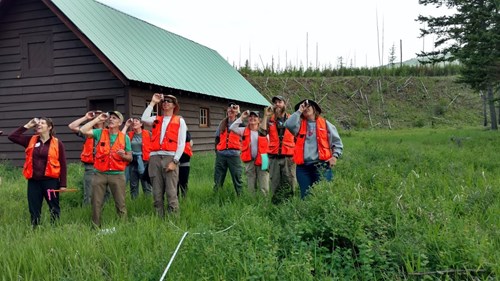
Teachers learn how to use a clinometer during a forestry activity while attending the workshop summer session at the Glacier Institute's Big Creek Outdoor Education Center.
The year-long, place-based workshop is modeled after the highly successful Forest for Every Classroom professional development program, which has a proven track record of success and has been offered through the U.S. Forest Service for two decades.
But while the Forest for Every Classroom program engages teachers with local forests, FWTTS expands the scope to create a place-based learning program focused on the entire Flathead Watershed. This means that teachers not only learn about their area forests, but also the streams, rivers and lakes that support them.
“There was a lot about the Forest for Every Classroom program that we really liked,” said Melissa Sladek, Science Communication Specialist for Glacier National Park and a member of the FWTTS steering committee. “But we decided to focus on the Flathead Watershed because it encompasses everything. It’s such an important piece of our landscape, economy and culture. To be able to connect teachers with our watershed and the ways that it is changing and being threatened has been a neat experience, not to mention extremely important for this area’s future sustainability.”
Planning for the FWTTS workshop first began in March 2017, when the workshop steering committee held a community meeting to gauge interest and received an overwhelming response.
Now in the midst of its pilot year, a group of eight teachers who represent K-12 classrooms from all over the Flathead Watershed have already participated in two of the four FWTTS sessions. The first session involved a four-day, three-night retreat at the Glacier Institute’s Big Creek Outdoor Education Center during the summer. In September, the group spent Friday evening and all day Saturday at the Flathead Lake Biological Station in Yellow Bay.
“I felt like the entire workshop was an exquisitely curated experience,” one teacher submitted in a post-session survey. “I loved the passion and knowledge of all the presenters, and how their unique perspectives created greater understanding of the issues facing the watershed. I also loved being able to collaborate across grade levels and schools—this is a rare experience.”
“Once again I am beyond impressed with the quality of this workshop,” another teacher added. “I love the concept, and the sheer amount of information presented. And the variety of presentations is fantastic.”
Next on the agenda, the FWTTS teachers will spend a winter session at the Izaak Walton Inn in Essex outside of Glacier National Park before closing out the program at Lone Pine State Park in the spring.
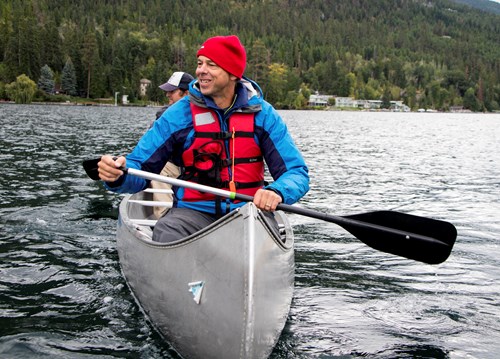
The workshop emphasizes hands-on experiences to connect educators with place-based learning and natural resource experts.
Outside of travel to and from the workshop locations, all aspects of the workshop are provided free of charge to the teachers, thanks to the financial support of the Glacier National Park Conservancy. The Flathead Lake Biological Station is also providing support to the workshop, covering the room and board for participants during the fall workshop session at the Bio Station facilities in Yellow Bay.
For members of FWTTS steering committee, the inaugural year of the workshop has been an incredible experience.
“It’s been really rewarding,” said Sladek. “I’m so glad to be a part of it. The fact that we have teachers who are so dedicated and innovative and interested in making this a better place for our kids…I’m continually amazed by our Montana educators.”
With momentum behind the workshop at full steam, the steering committee is already making preparations for 2020.
Teachers interested in participating in the next FWTTS workshop can expect the application period to open either in January or February of 2020. Any K-12 educator currently teaching at a school in the Flathead Watershed region is eligible to apply. A maximum of twelve teachers will be accepted into the program.
For more information about the Flathead Watershed through the Seasons workshop, visit the Glacier Institute’s website at www.glacierinstitute.org. More information about the Flathead Community of Resource Educators can be found at www.flatheadcore.org.
